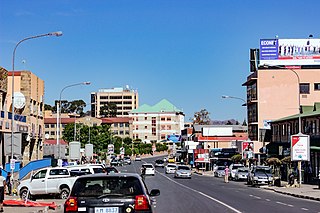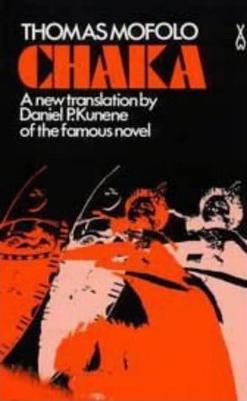
Lesotho, formally the Kingdom of Lesotho, formerly known as Basutoland, is a landlocked country in Southern Africa. As an enclave of South Africa, with which it shares a 1,106 km (687 mi) border, it is the largest sovereign enclave in the world, and the only one outside of the Italian Peninsula. It is situated in the Maloti Mountains and contains the highest peak in Southern Africa. It has an area of over 30,000 km2 (11,600 sq mi) and has a population of about two million. Its capital and largest city is Maseru. The country is also known by the nickname The Mountain Kingdom.

Maseru is the capital and largest city of Lesotho. It is also the capital of the Maseru District. Located on the Caledon River, Maseru lies directly on the Lesotho–South Africa border. Maseru had a population of 330,760 in the 2016 census. The city was established as a police camp and assigned as the capital after the country became a British protectorate in 1869. When the country achieved independence in 1966, Maseru retained its status as capital. The name of the city is a Sesotho word meaning "red sandstones".
SothoSesotho, also known as Southern Sotho or Sesotho sa Borwa is a Southern Bantu language of the Sotho–Tswana ("S.30") group, spoken in Lesotho, and South Africa where it is an official language.

The Sotho, also known as the Basotho, are a Sotho-Tswana ethnic group native to Southern Africa. They primarily inhabit the regions of Lesotho and South Africa.

The National University of Lesotho, the main and oldest university in Lesotho, is located in Roma, 34 km (21 mi) southeast of Maseru, the capital of Lesotho. The Roma valley is broad and is surrounded by a barrier of rugged mountains which provides magnificent scenery. The university enjoys a temperate climate with four distinct seasons. The governing body of the university is the council and academic policy is in the hands of Senate, both Council and Senate being established by the Act.

Thomas Mokopu Mofolo is often regarded as the first African novelist. His body of work, which consists of three books composed between 1905 and 1910, were first written in Sesotho, and then widely translated.
"Lesōthō Fatše La Bo-Ntat'a Rōna" is the national anthem of Lesotho. The lyrics were written by French missionary François Coillard and Swiss missionary Adolphe Mabille, and the music is taken from an 1820 hymnal composed by Swiss composer Ferdinand Samuel Laur. It was officially adopted as the national anthem in 1967. The original composition that the national anthem was based on had five verses, though only the first and last ended up being adopted.

Lesotho is a Southern African nation surrounded entirely by South Africa. The largest ethnic group is the Basotho. The Basotho culture is immersed in musical traditions.
Phuthi (Síphùthì) is a Nguni Bantu language spoken in southern Lesotho and areas in South Africa adjacent to the same border. The closest substantial living relative of Phuthi is Swati, spoken in Eswatini and the Mpumalanga province of South Africa. Although there is no contemporary sociocultural or political contact, Phuthi is linguistically part of a historic dialect continuum with Swati. Phuthi is heavily influenced by the surrounding Sesotho and Xhosa languages, but retains a distinct core of lexicon and grammar not found in either Xhosa or Sesotho, and found only partly in Swati to the north.

Chaka is the third and final novel by Lesotho writer Thomas Mofolo. Written in Sesotho, it is a mythic fictional retelling of the story of the rise and fall of the Zulu emperor-king Shaka. Following its first publication in 1925, it was published in English translation in 1931.

Hugh Travers Tracey was an English ethnomusicologist. He and his wife collected and archived music from Southern and Central Africa. From the 1920s through the 1970s, Tracey made over 35,000 recordings of African folk music. He popularized the mbira internationally under the name kalimba.

Tsidii Le Loka-Lupindo is an actress, vocalist and composer from South Africa and The Kingdom of Lesotho. She is best known for originating the role of Rafiki in the original Broadway production of Disney's stage musical, The Lion King.
Stefans Grové was a South African composer. Before his death the following assessment was made of him: "He is regarded by many as Africa's greatest living composer, possesses one of the most distinctive compositional voices of our time".
Ntšeliseng ’Masechele Khaketla was a pioneering poet, dramatist, translator, and teacher from Lesotho.
Teboho Mochaoa, known commonly by his stage name Morena Leraba is a Lesotho-born singer and rapper. He mainly uses traditional sesotho lyrics and combines them with electro, afro house and Hip hop. His lyrics are deeply rooted in Lesotho's traditional music, poetry, and its sub-genre, famo.
Sir Herbert Cecil Sloley, KCMG was a British colonial policeman and administrator. He was Resident Commissioner for Basutoland from circa 1900 to 1916.

Michael Mosoeu Moerane was a choral music composer and the first black South African to write a symphonic poem, in 1941.

The South African Music Encyclopedia is an encyclopedia of South(ern) African musicians and music. Its four volumes were published in 1979, 1982, 1984, and 1986 under the editorship of Afrikaans music scholar Jacques Philip Malan in both English and Afrikaans. Commissioned by the South African Music Council in 1960, the work was ultimately overseen by the Human Sciences Research Council and published by Oxford University Press.
Reuben Tholakele Caluza was a Zulu composer, educator, and significant figure in the development of African choral music and black popular music in South Africa. Known for blending traditional Zulu music with Western harmonic techniques like syncopation, his work modernized African music during the early 20th century. Caluza also played a central role in African musical theatre, using his choir performances to address social issues. His introduction of the syncopated marabi style to Zulu music left a lasting influence on South African music. His contributions to South African music are increasingly recognized, particularly as his legacy has been revisited in recent studies. A sound clip of one of Caluza's recordings can be accessed here.










